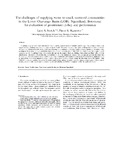The challenges of supplying water to small, scattered communities in the Lower Okavango Basin (LOB), Ngamiland, Botswana: An evaluation of government policy and performance

View/
Date
2007Author
Swatuk, L.A.
Kgomotso, P.K.
Publisher
Elsevier, www.elsevier.com/locate/pceType
Published ArticleMetadata
Show full item recordAbstract
Supplying adequate water and sanitation facilities to small, scattered rural communities and/or large, fast growing settlements in
remote areas is a challenge not easily met anywhere in the world. This article focuses on just such a challenge in the remote, rural area
of Ngamiland District in north-western Botswana. Drawing on a combination of critical analysis of government and secondary data,
participant observation, and key stakeholder interviews conducted over the period 2004–2006, the article shows that despite a good
aggregate record of supplying water and sanitation throughout the country, there are abiding, often serious, problems with supply in
remote areas. The research reveals that due to a combination of limited human and financial resource capacity, government policy that
deliberately under-serves remote areas in order to encourage resettlement, and complacence among key decision-takers, supply problems
go unresolved. The article suggests four key interventions as possible ways forward: using the Okavango Delta Management Plan
(ODMP) process as a guiding framework for institutional reform; linking research directly to human resource capacity development;
treating water as both a social and an economic good; and soliciting an IWRM ‘champion’ to drive the political process.
Collections
- Research articles (ORI) [270]
